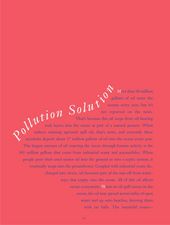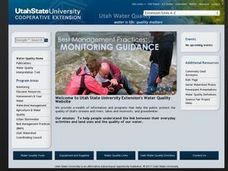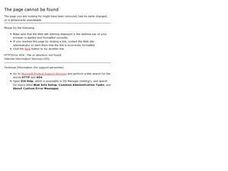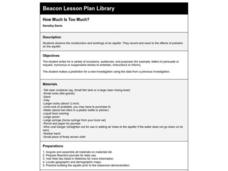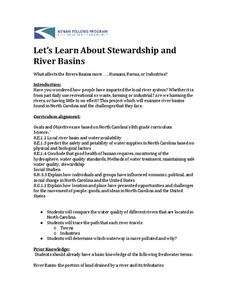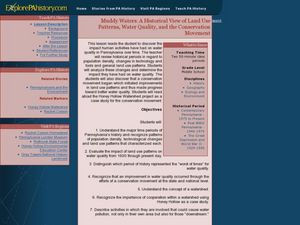Curated OER
Water and Land Ecosystems
Students investigate the differences between a land and aquatic ecosystem. They use the information in order to present it in an assessment. There are target questions that can be used to guide research, lead a classroom discussion, or...
Curated OER
Water Pollution Graphing Activity
Young scholars describe and identify the link between land use activities within a watershed and water quality. They evaluate the quality of a "water sample" ( a bag of skittles), graph their results, and form a hypothesis about the land...
Curated OER
Local Environmental Issues: Pollution
Third graders discuss the ways in which human interaction with the environment and production of waste products contribute to pollution. Through a pollution demonstration, they explain how various groups of plants and animals can be...
Curated OER
Pollution Solution
Fourth graders examine how trees help to absorb the pollution that is emitted from automobiles. They review the process of photosynthesis and determine how forest management is important on their reservation. They think about the...
Curated OER
Our Earth
In this Earth's environment worksheet, young scholars complete a crossword puzzle given 35 clues about a variety of topics related to our Earth. Topics include ecosystems, precipitation, biomes, energy transfer, soil, weathering and rocks.
Rivanna Regional Stormwater Education Partnership
Does It Soak Right In?
Which materials are best for groundwater runoff, and which are best for percolation? Discuss the water table with several experiments about different types of soil, pollution, precipitation, and filtration. The experiments assign roles...
Curated OER
Landscape Picture Map
Young scholars explore pollution of water sources. In this ecology lesson, students define and identify natural resources. Young scholars use map skills to locate local rivers and lakes used for recreation. Students brainstorm ways in...
Curated OER
Surface Water Model
Students examine, through demonstration and experimentation, how water moves through watershed, identify pollutants that can enter water system from different land use activities, and discuss ways people can help prevent water pollution.
Curated OER
Keep the Environment Clean
Pupils discuss ways our environment becomes polluted. They make a list of ways to keep it clean.
Curated OER
Watershed Model
Students view a presentation of water and land and how we need to protect our water resources. In this water lesson plan, students discuss how we rely on water, and complete activities in all subjects related to water.
Curated OER
All Hands on Deck: A Harbor Education Program
Students build a model of an estuary. In this wetland lesson, students build a model estuary with a paint tray and modeling clay. They use the model to illustrate the impact of non-point pollution on the watershed.
Curated OER
"Hard" Data from Space
Students use satellite images to analyze development patterns within Baltimore City. They prepare a land cover map for Baltimore indicating the prevalence of impervious surfaces and explore how these patterns affect water pollution.
Curated OER
Clean Air: Our Health Matters
Students learn about the human respiratory system. In this pollution instructional activity, students identify the parts of the respiratory system and what happens to them when they breathe in polluted air. Students learn about the...
Curated OER
Who Dirtied the Water?
Students develop a greater understanding and concern for the plight of our coastal waterways. Students begin to recognize that we are all partially responsible for water pollution.
Curated OER
Water: Naturally Cleaned
Young scholars use stream trays covered in different types of rocks or soil to investigate infiltrates and runoff. For this water pollution lesson, students work in groups with stream trays that have different substrates. They write a...
Curated OER
HOW MUCH IS TOO MUCH?
Students observe the construction and workings of an aquifer. They record and react to the effects of pollution on the aquifer.
Curated OER
Where Does Al the Waste Go?
Students construct a sanitary mini-landfill and an open mini-dump. Over a thirty day period, they compare the two methods and determine landfills are envorinmentally safer. They observe a demonstration of burning waste. They create...
Curated OER
Marine Debris
Students perform experiments to examine if debris float, or blow in the wind. The effects of these characteristics on the marine debris are then discussed. They determine how a material can influence what becomes marine debris.
Curated OER
Marine Debris
Now is the time to educate tomorrow's citizens to care for the planet, and here is a lesson to help facilitate the process. Collect some marine debris and bring it into class. Have your class separate it into types and then test each...
Curated OER
Onondaga Lake Educational Unit
Students outline the major events in the history of Onondaga Lake. They identify the parties involved in the events of Onondaga Lake. Students determine the sources of pollution that impacted Onondaga lake. They outline the major land...
Curated OER
Global Change — Change and Cycles Where Land, Air and Water Meet
Pupils participate in an experiment to define a parts-per-billion solution. In this ecology lesson, students select a second substance to create a parts-per-billion solution and observe and record their results. Pupils work in groups to...
Kenan Fellows
Let's Learn About Stewardship and River Basins
What does it mean to be a good steward? Middle school environmentalists learn to care for their state's waterways through research, a guest speaker, and poster activity. Groups must locate and learn more about a river basin and the human...
Curated OER
To Protect Your Streams, Protect Your Mountains
Students build and experiment with a watershed to understand the effects of pollution. In this movement of water lesson, students work in groups creating rock formations and change the viscosity of the liquids falling down the mountain....
Curated OER
Muddy Waters: A historical view of land use patterns, water quality, and the conservation movement
Students research the impact that human activity had on Pennsylvania's water supply over time. In this water quality lesson plan, students research, discuss, and write about how Pennsylvania's water quality has been affected and what...
Other popular searches
- Causes Land Pollution
- Environmental Land Pollution
- Land Pollution Recycling
- Land Pollution Solutions
- Effects Land Pollution
- Effects of Land Pollution
- Water Land Air Pollutants
- Land Pollution Lesson Plans
- Prevention of Land Pollution
- E Waste Land Pollution





